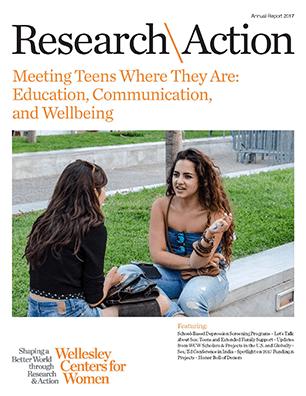Sex/Ed Conference in India
The Centre for Studies in Gender and Sexuality (CSGS) at Ashoka University and the Wellesley Centers for Women (WCW) organized Sex/Ed, an international conference held in New Delhi, India, in November 2017.
Sex and education bear a complex relation to one another. While sex is considered a subject on which education should be imparted, there are attempts to exorcise sexuality from history, art, literature, and public spaces. Conference planners noted that these tendencies persist even as India has historically been one of the few cultures that have tied sex to the sacred, as can be seen through the sculptures and the murals of Khajuraho, profuse queerness in Hindu mythology, or Sufi traditions. There are laws regulating sexual interactions in educational institutions as well as those enforcing “decency” in public spaces.
The Sex/Ed conference aimed to place this relationship between sex and education in the context of a rich and sexually charged international history, both within and beyond the sanctioned limits of sex education. It addressed questions such as: Is sex good for education or is it not? Are there pedagogical advantages to talking about sex in the classroom? Why is sex perceived as a dirty secret from which decent people need protection? What is the relationship of sex to education, history, culture, and law?
While there have been visits, networking, and co-presenting during WCW’s parallel event at the United Nations Commission on the Status of Women in 2016, this was the first event to formally showcase the collaboration between Ashoka’s CSGS and WCW. The twoday conference addressed the intersections between gender and sexuality, and the relation of both to sex. It focused on educational policy as well as literary and socio-cultural theories about education. Participants examined the law, letters, people, histories, causes, and consequences, in order to paint a vivid picture of the various issues involved in both sex and education. The cross-disciplinary presenters addressed questions that involve an international realm while also remaining mindful of local contexts.
The first conference panel laid out the relationship among sex, education, history, art, and law that frames contemporary responses to sexuality. This framing used examples from mythology, literature, temple architecture in India, as well as a discussion on the historical relationship of sex to laws regulating desire in educational institutions as well as public spaces. Building on this, subsequent presentations addressed:
- Sex and Education in a Culture of Fear, Victimhood, and Trauma
- Sex/Ed/Harassment
- Sex/Ed/Classroom
- “It’s More Than Black and White, and Right or Wrong”: A Reproductive Justice Approach to Understanding Power’s Influence on Black Women’s Sexual Education
- Sex/Ed/Work
- Sex/Ed/Popular Culture
The more than two dozen conference presenters included:
- Nandita Dutta, staff member, CSGS
- Octavio Gonzalez, Ph.D., assistant professor of English, Wellesley College
- Emmy Howe, M.Ed., co-director of the National SEED Project, WCW
- Layli Maparyan, Ph.D., the Katherine Stone Kaufmann ’67 executive director of WCW
- Madhavi Menon, Ph.D., professor of English, Ashoka University, and director of CSGS
- Shiv Datt Sharma, manager, Research and Projects, CSGS
- Harleen Singh, Ph.D., associate professor, Women’s, Gender, and Sexuality Studies Program, Brandeis University
- Nan Stein, Ed.D., senior research scientist, WCW
- Dionne P. Stephens, Ph.D., psychology professor, Florida International University
In addition to the more formal keynotes, panels, and extensive Q&A sessions, the conference also featured performances including video screenings and theatre shows, art installations, and poetry slams.


